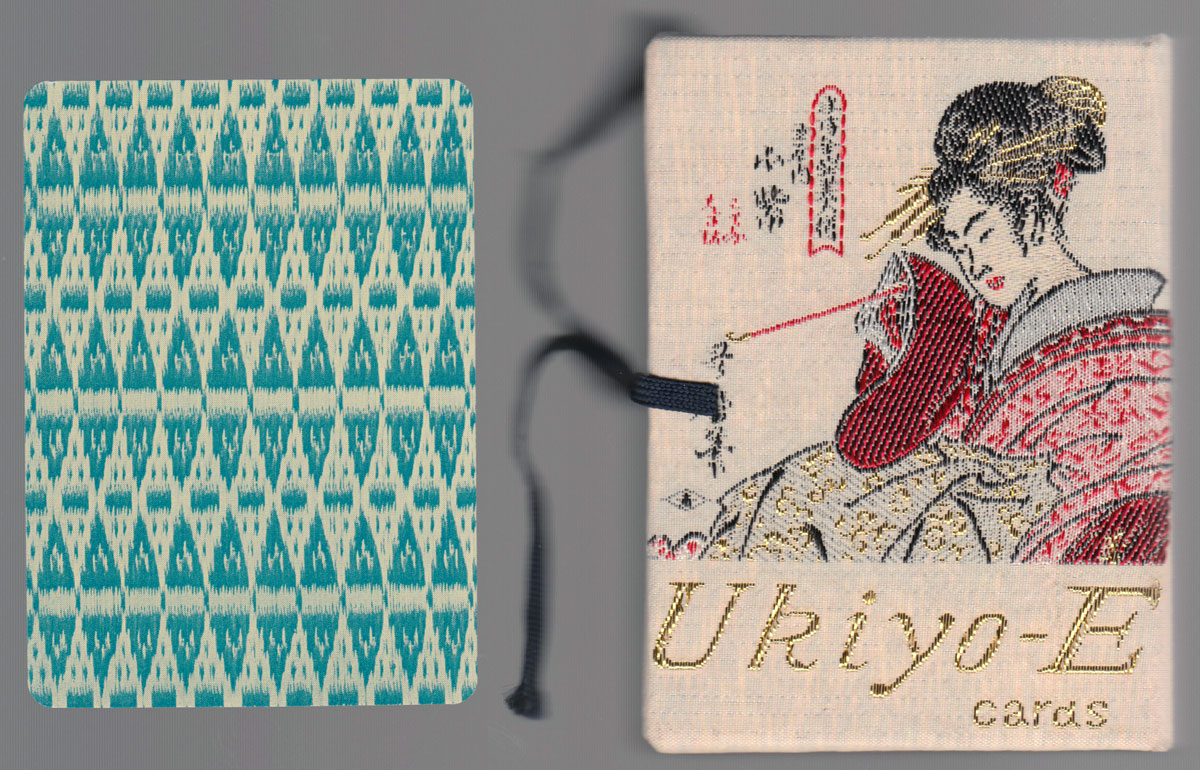Sanyo Ukiyo-E
Ukiyo-E deck for Sanyo Enterprise Co.
Ukiyo-E deck published by Sanyo Enterprise Co. Ukiyo-E (浮世絵; Japanese pronunciation: [u.ki.jo.e]) was a Japanese genre of painting and woodblock printing with subjects typical of the decadent lifestyle of the middle classes from the 17th century to the 19th century. Their entertainment was the Geishas and the Sumo wrestling and often Courtesans. The Ukiyo-E, which means floating world or world in the clouds, depicted these interests with pictures of the Geishas and Courtesans as beautiful women and the Kabuki actors and Sumo wrestlers as heroes. The natural world was also depicted by some of the artists. See the information leaflet►

Above: Ukiyo-E deck for Sanyo Enterprise Co, Tokyo, 1980s. The manufacturer is not stated.
UTAMARO (1753-1806) created woodblock prints of beautiful women and the Utamaro playing cards show details from some of his works.
HIROSHIGE (1797-1858) is considered to be the last of the great Ukiyo-E masters. Hiroshige was most famous for his 53 stations of the Tokaido (East Sea) Road. He avoided beautiful women and concentrated on the Kabuki actors and Geishas for his human subjects but he mainly produced landscapes. The Tokaido was the main highway in Japan going from Edo (now called Tokyo) to Kyoto a distance of 450 km on the island of Honshu. In the 17th century the government set up 53 stations along the route with stables and somewhere to sleep for travellers to rest during their journey. It is still the busiest highway in Japan today. See Hiroshige Ukiyo-e deck►
Minolta Ukiyo-E
A similar deck was published for Minolta

Above: Minolta Ukiyo-E deck, 52 cards + 2 jokers in telescopic box. Image courtesy Sean Comstock.

By Rex Pitts (1940-2021)
Member since January 30, 2009
Rex's main interest was in card games, because, he said, they were cheap and easy to get hold of in his early days of collecting. He is well known for his extensive knowledge of Pepys games and his book is on the bookshelves of many.
His other interest was non-standard playing cards. He also had collections of sheet music, music CDs, models of London buses, London Transport timetables and maps and other objects that intrigued him.
Rex had a chequered career at school. He was expelled twice, on one occasion for smoking! Despite this he trained as a radio engineer and worked for the BBC in the World Service.
Later he moved into sales and worked for a firm that made all kinds of packaging, a job he enjoyed until his retirement. He became an expert on boxes and would always investigate those that held his cards. He could always recognize a box made for Pepys, which were the same as those of Alf Cooke’s Universal Playing Card Company, who printed the card games. This interest changed into an ability to make and mend boxes, which he did with great dexterity. He loved this kind of handicraft work.
His dexterity of hand and eye soon led to his making card games of his own design. He spent hours and hours carefully cutting them out and colouring them by hand.
Related Articles

Sumo Wrestling
Traditional Japanese Sumo Wrestling playing cards with photograph of different wrestler on each card...

Dancing
“Dancing” playing cards manufactured by Nintendo for Torii Dance School, Osaka.

Tactics Design
Late modernist Japanese playing cards designed by Masayoshi Nakajo for Tactics Design.

Dragon Quest
Card game based on the Japanese video game series with character illustrations by Akira Toriyama

Morinaga Hakuho playing cards
Artistic playing cards attributed to Morinaga Hakuho and printed by Nintendo, c.1985.

Shin-Tōmei Expressway Opening Commemoration
Promotional playing cards for the Shin-Tōmei Expressway, a major Japanese expressway that opened in ...

Hana-Trump トランプ
Hana-Trump cards from Japan are Hana-Fuda flower cards with miniature international playing cards in...

Mahjong-Trump playing cards
Mahjong tiles integrated with international playing cards.

The Decadent Deck
Studies in the eroticism of the female body by Inge Clayton.

Historic Shakespeare
“Historic Shakespeare” playing cards featuring Shakespearean characters by Chas Goodall & Son.

Japanese Beauties
An elegant fusion of Western and Japanese traditions modelled after ukiyo-e.

Sunday Night / Nichiyoubi no Yoru
An irreverent, avant-garde deck unofficially titled "Nichiyoubi no Yoru" (Sunday Night), designed by...

Angel 52 Secrets
Vintage “52 Secret” art deco-inspired playing cards from Japan.

Emilio Tadini playing cards
Beautiful dreamlike playing card designs by Emilio Tadini.

Banjo Cards
Images of the peg heads from 4-string banjos from Akira Tsumura’s renowned collection.

Zürcher Festspiel 1903
Swiss-suited pack designed by Robert Hardmeyer featuring figures from art and politics.
Most Popular
Our top articles from the past 28 days










